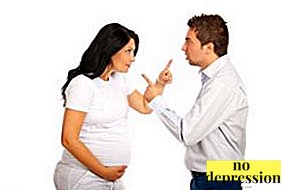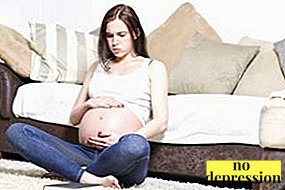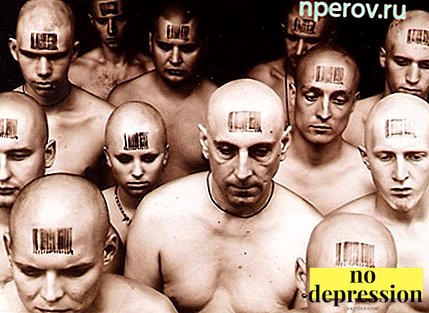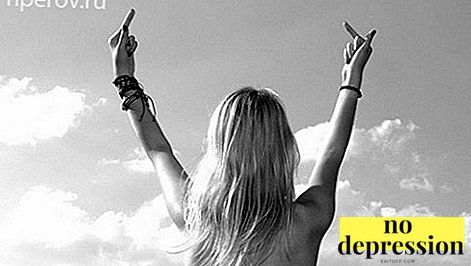Pregnancy is a very difficult period in the life of every womandemanding utmost attention to your body.
At the same time, the care of the future mother about herself and the developing fetus is not limited to maintaining a satisfactory physiological state - it is highly desirable that the future mother is psychologically stable and able to receive positive emotions, feel joy from the events.
Depression during pregnancy - a very common psychological disorder during this period that can eliminate all pleasant experiences. What are its manifestations, causes and effects?
Do pregnant women?

Depression - mental disorder, which is characterized by a decrease in mood, loss of the ability to feel joy, pessimism, negative judgments about the world and a decrease in motor activity.
Two thirds of people who are depressed are women.
It is only natural that a woman carrying a child and experiencing complex physiological changes in her body, which the people around her observe only from the side, they fall into the zone of risk of being depressed.
The concept of antenatal spleen
Prenatal depression test up to 10% of women, its course is caused by the experiences of the mother associated with her pregnancy and changes in the hormonal background in the body during this period.
Do not confuse depression with short-term drops and mood swings.
Causes
Provoke The following factors can cause prenatal depression:
- Strong stress in unplanned pregnancy.
- The unwillingness of the father of the unborn child to have children, unwillingness to be responsible for a full-fledged family and the absence of his moral support for the pregnant woman.
 Familial predisposition of a pregnant woman to mental disorders, the presence of blood relatives with mental illness.
Familial predisposition of a pregnant woman to mental disorders, the presence of blood relatives with mental illness.- Unsatisfactory social and living conditions - lack of own housing, financial difficulties.
- Long-term treatment of infertility or miscarriages in the past. This raises the fear of losing the child.
- Stressful situations - the loss of a loved one, forced to move to a new place of residence.
- Frequent use before pregnancy sedatives and antidepressants.
- Pregnancy complications - toxicosis, threatened miscarriage.
- Predisposition of the future mother to depression.
The simultaneous presence of several factors increases the risk of depression during pregnancy.
Depression during pregnancy: causes, symptoms and treatment:
Features of flow in different trimesters
Pregnancy of a woman is divided into several stages - trimesters, each of which has its own peculiarities during the course of depression.
 First trimester. In the early stages, a woman is only beginning to realize her pregnancy and the changes occurring with it. There is an adaptation to a new way of life, implying the abandonment of many of the usual activities - for example, hot baths or visits to the sauna, horseback riding, and other types of outdoor activities.
First trimester. In the early stages, a woman is only beginning to realize her pregnancy and the changes occurring with it. There is an adaptation to a new way of life, implying the abandonment of many of the usual activities - for example, hot baths or visits to the sauna, horseback riding, and other types of outdoor activities.- Second trimester During this period, the woman becomes accustomed to the fact that a new life was born inside her. The first movements of the baby, of course, bring joy, but the realization that you have to temporarily abandon the active professional activity, leave your studies create the impression of “losing yourself”, the impossibility of your own realization.
- Third trimester This time is characterized by the fear of the culmination of pregnancy - childbirth. This is the strongest stress in which even balanced and non-depressed women lose their emotional stability.
The changing way of life at the beginning of pregnancy, the inevitability of adopting certain restrictions for a rather long period of time with an actively changing hormonal background create prerequisites for a return to the original lifestyle, cause a "negative effect" woman of his position.
The physiological state of the pregnant woman is actively changing - an increase in body weight, possible back pains create additional negative thoughts.

Pregnant on late terms may panic fear the very process of childbirth - especially if they are the first.
In addition, an enlarged belly, which makes it difficult to perform even the simplest movements and actions, creates the impression of helplessness and dependence on others.
Characteristic dissatisfaction with their appearance, psychological fatigue of the pregnant in the last weeks.
After abortion or miscarriage
Pregnancy, abortion or miscarriage - This is a tragedy for a woman, putting on her a very strong psycho-physiological burden.
After an abortion, a woman may have the hardest feeling of guilt for stopping a child’s life.
With missed abortion or miscarriage, thoughts of own inferioritylike women. The loss of the child, the expectations turns into a sense of despair, anger and detachment.
Why does depression occur in a pregnant woman? How to help yourself? Find out about this from the video:
How to recognize?
Prenatal depression is different from the usual change of mood, she deeper and lingering. The signs marked in time allow early treatment and increase the chances of an easier course of depression. Symptoms of depression:
 limiting the circle of communication. A pregnant woman is reduced social activity, there is a reluctance to see people to whom she was previously supportive;
limiting the circle of communication. A pregnant woman is reduced social activity, there is a reluctance to see people to whom she was previously supportive;- frequent refusals to eat, lack of appetite;
- difficulty concentrating, absent-mindedness;
- violation of the normal sleep cycle - excessive drowsiness or insomnia;
- unreasonable guilt, own worthlessness and lack of demand;
- causeless anxiety; state of anxiety;
- sense of hopelessness, obsessive thoughts about death, suicide;
- rapid physical and mental fatigue;
- rejection of those activities that previously brought moral satisfaction;
- inconsistent, illogical, unusual for pregnant women behavior;
- unwillingness to attend antenatal clinic, gynecologist, contact with doctors;
- conscious use of harmful substances - tobacco, alcohol, drugs;
- chronic headaches or problems with the gastrointestinal tract.
Normal psychological state during pregnancy implies the joy of the early appearance of the child, enthusiasm and emotional lift.
With depression, the future mother loses interest in the future - her own and the child, is indifferent to possible problems or, on the contrary, exaggerates the importance of trifles, feels a sense of depression and apathy.
How long does it last and what is dangerous?
Arbitrarily current, advanced depression can lead to serious complications:
 physical exhaustion and, as a result, a threat to the health of the child;
physical exhaustion and, as a result, a threat to the health of the child;- suicidal behavior;
- neurological disorders affecting the cardiovascular system;
- the birth of a child who has low basic reflexes and has difficulties in further physical and intellectual development.
Prenatal depression refers only during pregnancy and its presence does not imply a tendency to the onset of postpartum depression.
Consciousness of the woman after giving birth switches to the care of the child and his upbringing.
How to get rid of this condition?
How to fight? The observed symptoms of prenatal depression make it possible to start timely treatment and prevent possible complications. Treatment can take medication and psychotherapy.
- What drugs can be taken? Treatment with pharmacological drugs prescribed for severe stages of depression. In this case, the following medications are used - sertraline, paroxetine, citalopram, venlafaxine, etc. It is also possible to use herbal preparations, however, both should be prescribed by a doctor in cases where their use is greater than the possible harm to the fetus. use of drugs.
- Councils of the psychologist. It is much better to recognize the mild stage of depression and level it out without the use of pharmaceuticals.
- Practical recommendations. It is not necessary to perceive the need for rest with antenatal depression as a categorical refusal of any activity. Much better to find an occupation without contraindications, from which you can get moral satisfaction. It should focus on positive emotions and strive to get them from their activities.

Psychologists advise to pay attention to the full rest pregnant.
At the same time, family therapy is important - so that the people around help the woman to survive the difficulties, give her moral and physical support, treat her with understanding.
What is important is healthy, full sleep at least 8 hours a day. Special attention should be paid to the diet. - it must contain all the necessary trace elements. You should also be more in the fresh air.
Do what is pleasant - let your relatives treat this with understanding. Ask them for support, as they are also responsible for this period of child development.
How does stress during pregnancy affect baby development? The psychologist comments:
What not to do?
When diagnosing prenatal depression should maximally eliminate psychological stress.

Avoid situations that can lead to conflict or quarrel, do not overstrain morally and physically.
Limit the flow of information that can bring moral experiences, fears and anxieties.
Move away from unpleasant stories from life. Do not provoke negative emotions.
Give up restrictions that are not provided for contraindications during pregnancy. Try to live life to the fullest and get maximum pleasure from her. Carefully monitor your psychological state.
You should not panic when you are in a bad mood, however, remember that a predisposition to prenatal depression on time is much easier to treat and help make your pregnancy a pleasant period in your life.
How to cope with stress during pregnancy? Tips:

 Familial predisposition of a pregnant woman to mental disorders, the presence of blood relatives with mental illness.
Familial predisposition of a pregnant woman to mental disorders, the presence of blood relatives with mental illness. First trimester. In the early stages, a woman is only beginning to realize her pregnancy and the changes occurring with it. There is an adaptation to a new way of life, implying the abandonment of many of the usual activities - for example, hot baths or visits to the sauna, horseback riding, and other types of outdoor activities.
First trimester. In the early stages, a woman is only beginning to realize her pregnancy and the changes occurring with it. There is an adaptation to a new way of life, implying the abandonment of many of the usual activities - for example, hot baths or visits to the sauna, horseback riding, and other types of outdoor activities. limiting the circle of communication. A pregnant woman is reduced social activity, there is a reluctance to see people to whom she was previously supportive;
limiting the circle of communication. A pregnant woman is reduced social activity, there is a reluctance to see people to whom she was previously supportive; physical exhaustion and, as a result, a threat to the health of the child;
physical exhaustion and, as a result, a threat to the health of the child;

